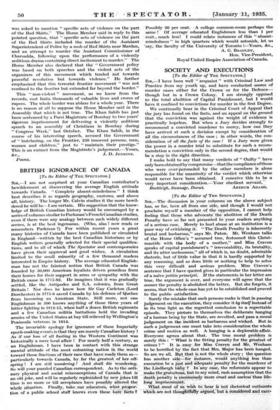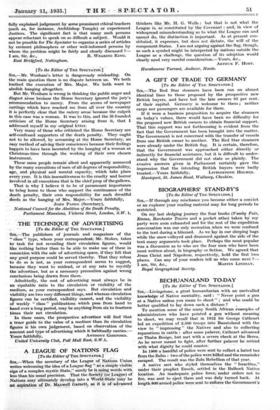[To the Editor of THE SPECTATOR.] Sia,—The discussion in youir
columns-On the above subject has, so far, been all_ from one side, and though I would-not proclaim myself a member. of the opposition, I cannot help feeling that those whO advocate the abolition of tfie Death Penalty have so far not Piesenied in your readers anything of a serious case. Merely to hurl abuse at an institution is a poor way of criticizing it. " The'Death Penalty is inherently brutal and barbarous," says Mr. Paton. Mr. Wenham talks of the Home Office's " accursed tree, festooned this Christ- mastide with the body of a mother," and Miss ,Craven speaks of capital punishment's " irrevocability, its brutality, and its utter uselessness," all of which is, no doubt, admirable rhetoric, but of little value in that it is hardly supported by any reasoning, and so does little or nothing to help to solve this very difficult and serious problem. Miss Craven's sentence that I have quoted gives in particular the impression of a naive petitio principii. If the statements in her letter, are true, the argument is over, and everyone will agree that the sooner the penalty is abolished the better, But she forgets, it seems, that the whole case has yet to be established and proved to the public satisfaction.
- Surely the mistake that such persons make is that in passing judgement on the execution, they consider it by itself instead of in its true light. as the regretted conclusion to a regrettable episode. They picture to themselves the deliberate hanging of a human being by the State, are revolted, and pass a moral judgement on the: incident as barbarous and wicked. But in such a judgement one must take into consideration the whole crime and motive as well. A. hanging is a deplorable affair. Everyone agrees about that. The true moral problem is surely this : " What is the fitting penalty for the greatest of crimes ? " It is easy for Miss Craven and Mr. Wenham to be horrified by the fact that Mrs. Major has-heen hanged. So are we all, But that is. not the whole story ; the question has another side-fOr instance, would anything less than execution bea just and adequate penalty for the murderer of the Lindbergh baby? In-any case, the reformists appear to make the gratuitous, but to my mind, rash assumption that the death penalty is enoi-inonsly more cruel and useless than life- long 'imprisonment.
What most of us wish to 'hear is not rhetorical outbursts .
which are not thoughtfully aiglied; but 'a Considered and care-
fully explained-judgement by some prominent ethical teachers .(such as, for instance, Archbishop Temple) or experienced Justices. The significant fact is that many such persons appear- reluctant to speak on so difficult a subject.. Would it not be possible for The Spectator to organize a series of articles by eminent philosophers or other well-informed persons by whom the problem might be fairly and clearly discussed ?-







































 Previous page
Previous page